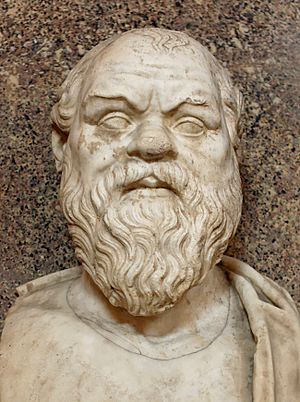144. Solitude and Education, Part 6: Socrates and Aristotle on Being Friends to Ourselves
Friedrich Nietzsche (1844-1900), in his book Daybreak (1881), wrote:
“On Education. – I have gradually seen the light as to the most universal deficiency in our kind of cultivation and education: no one learns, no one strives after, no one teaches – the endurance of solitude.” (aphorism #443, translated by Hollingdale)
But why the endurance of solitude or, to use Philip Koch’s definition from his book Solitude: A Philosophical Encounter (Open Court, 1994), this “time in which experience is disengaged from other people” (27)? So far we have considered five closely related answers: (1) solitude can help us find our authentic individuality; (2) solitude can help us understand other people and things more objectively; (3) we should embrace solitude if we are to truly read in order to encounter greatness and expand our self; (4) solitude can facilitate a state of disinterested contemplation which can help us overcome our cravings; and (5) we should endure solitude in order to feel a primal sympathy with nature – a sympathy which can facilitate the development of many virtues (go here for these posts). Now let’s consider a sixth and final answer that builds on the fifth with its emphasis on virtue:
(6) Solitude can help us assess to what extent we are virtuous.
In the concluding passages of Plato’s dialogue Hippias Major, Socrates claims he doesn’t dare, despite the various difficulties it will bring him, give impressive speeches that persuade people if he knows he can’t rationally justify the content of these speeches. Why doesn’t he dare? Because when he goes home in solitude he can’t escape a critic who shares his house:
“Hippias, my friend, you’re a lucky man, because you know which activities a man should practice, and you’ve practiced them too – successfully, as you say. But I’m apparently held back by my crazy luck. I wander around and I’m always getting stuck. If I make a display of how stuck I am to you wise men, I get mud-spattered by your speeches when I display it. You all say what you just said, that I am spending my time on things that are silly and small and worthless. But when I’m convinced by you and say what you say, that it’s much the most excellent thing to be able to present a speech well and finely, and get things done in court or any other gathering, I hear every insult from that man (among others around here) who has always been refuting me. He happens to be a close relative of mine, and he lives in the same house. So when I go home to my own place and he hears me saying those things, he asks if I’m not ashamed that I dare discuss fine activities when I’ve been so plainly refuted about the fine, and it’s clear I don’t even know at all what that is itself! “Look,” he’ll say. “How will you know whose speech – or any other action – is finely presented or not, when you are ignorant of the fine? And when you’re in a state like that, do you think it’s any better for you to live than die?” That’s what I get, as I said. Insults and blame from you, insults from him. But I suppose it is necessary to bear all that. It wouldn’t be strange if it were good for me. I actually think, Hippias, that associating with both of you has done me good. The proverb says, “What’s fine is hard” – I think I know that.” (translated by John M. Cooper)
Socrates lives with his worst critic – himself – who is merciless in pointing out his inconsistencies, contradictions, hypocrisies, and so on. But such a critic can, as Socrates notes, be good for him. Why? If we consider what Plato writes elsewhere about the soul, we have a ready response: it helps the rational part of our soul develop more wisdom which can, in turn, guide our desires for social recognition and pleasure so that we develop courage and moderation respectively. Such a wise, courageous, and moderate soul would be a just soul. Thus by heeding his inner critic Socrates is able to assess to what extent he is really making progress in the development of virtue rather than just appearing to make progress. Hannah Arendt, in her book Life of the Mind, Vol. 1 (Harcourt Brace, 1978), calls Socrates’ inner dialogue the two-in-one:
“When Hippias goes home, he remains one, for, though he lives alone, he does not seek to keep himself company. He certainly does not lose consciousness; he is simply not in the habit of actualizing it. Instead, when Socrates goes home, he is not alone, he is by himself. Clearly, with this fellow who awaits him, Socrates has to come to some kind of agreement, because they live under the same roof. Better to be at odds with the whole world than be at odds with the only one you are forced to live together with when you have left company behind.” (188)
Hannah Arendt
She elaborates with reference to Aristotle:
“What Socrates discovered is that we can have intercourse with ourselves, as well as with others, and that the two kinds of intercourse are somehow related. Aristotle, speaking about friendship, remarked: “The friend is another self” – meaning: you can carry on the dialogue of thought with him just as well as with yourself. This is still in the Socratic tradition, except that Socrates would have said: The self, too, is a kind of friend.” (188-189).
And what is the law that governs such friendships? Arendt rightly notes that it is this:
Do not contradict yourself.
In his Nicomachean Ethics (book 9, chapter 4), Aristotle elaborates on how this law relates to friendship, the development of virtue, and solitude. He shows how virtuous people are friends to themselves because their actions have been consistent. As a result, they can keep themselves company in solitude. But vicious people run from solitude into the crowd where they can forget their internal contradictions. I will conclude this post series with these powerful passages from Aristotle that show how the endurance of solitude can help us assess whether or not our moral education has succeeded:
“Friendly relations with one’s neighbours, and the marks by which friendships are defined, seem to have proceeded from a man’s relations to himself. For (1) we define a friend as one who wishes and does what is good, or seems so, for the sake of his friend, or (2) as one who wishes his friend to exist and live, for his sake; which mothers do to their children, and friends do who have come into conflict. And (3) others define him as one who lives with and (4) has the same tastes as another, or (5) one who grieves and rejoices with his friend; and this too is found in mothers most of all. It is by some one of these characterstics that friendship too is defined.
Now each of these is true of the good man’s relation to himself (and of all other men in so far as they think themselves good; virtue and the good man seem, as has been said, to be the measure of every class of things). For his opinions are harmonious, and he desires the same things with all his soul; and therefore he wishes for himself what is good and what seems so, and does it (for it is characteristic of the good man to work out the good), and does so for his own sake (for he does it for the sake of the intellectual element in him, which is thought to be the man himself); and he wishes himself to live and be preserved, and especially the element by virtue of which he thinks. For existence is good to the virtuous man, and each man wishes himself what is good, while no one chooses to possess the whole world if he has first to become some one else (for that matter, even now God possesses the good); he wishes for this only on condition of being whatever he is; and the element that thinks would seem to be the individual man, or to be so more than any other element in him. And such a man wishes to live with himself; for he does so with pleasure, since the memories of his past acts are delightful and his hopes for the future are good, and therefore pleasant. His mind is well stored too with subjects of contemplation. And he grieves and rejoices, more than any other, with himself; for the same thing is always painful, and the same thing always pleasant, and not one thing at one time and another at another; he has, so to speak, nothing to repent of.
Therefore, since each of these characteristics belongs to the good man in relation to himself, and he is related to his friend as to himself (for his friend is another self), friendship too is thought to be one of these attributes, and those who have these attributes to be friends. Whether there is or is not friendship between a man and himself is a question we may dismiss for the present; there would seem to be friendship in so far as he is two or more, to judge from the afore-mentioned attributes of friendship, and from the fact that the extreme of friendship is likened to one’s love for oneself.
But the attributes named seem to belong even to the majority of men, poor creatures though they may be. Are we to say then that in so far as they are satisfied with themselves and think they are good, they share in these attributes? Certainly no one who is thoroughly bad and impious has these attributes, or even seems to do so. They hardly belong even to inferior people; for they are at variance with themselves, and have appetites for some things and rational desires for others. This is true, for instance, of incontinent people; for they choose, instead of the things they themselves think good, things that are pleasant but hurtful; while others again, through cowardice and laziness, shrink from doing what they think best for themselves. And those who have done many terrible deeds and are hated for their wickedness even shrink from life and destroy themselves. And wicked men seek for people with whom to spend their days, and shun themselves; for they remember many a grevious deed, and anticipate others like them, when they are by themselves, but when they are with others they forget. And having nothing lovable in them they have no feeling of love to themselves. Therefore also such men do not rejoice or grieve with themselves; for their soul is rent by faction, and one element in it by reason of its wickedness grieves when it abstains from certain acts, while the other part is pleased, and one draws them this way and the other that, as if they were pulling them in pieces. If a man cannot at the same time be pained and pleased, at all events after a short time he is pained because he was pleased, and he could have wished that these things had not been pleasant to him; for bad men are laden with repentance.
Therefore the bad man does not seem to be amicably disposed even to himself, because there is nothing in him to love; so that if to be thus is the height of wretchedness, we should strain every nerve to avoid wickedness and should endeavour to be good; for so and only so can one be either friendly to oneself or a friend to another.” (translated by W.D. Ross)
For my series that compares and contrasts the pedagogies of Socrates and John Dewey, go here. For my thoughts on aesthetics and education, go here.


